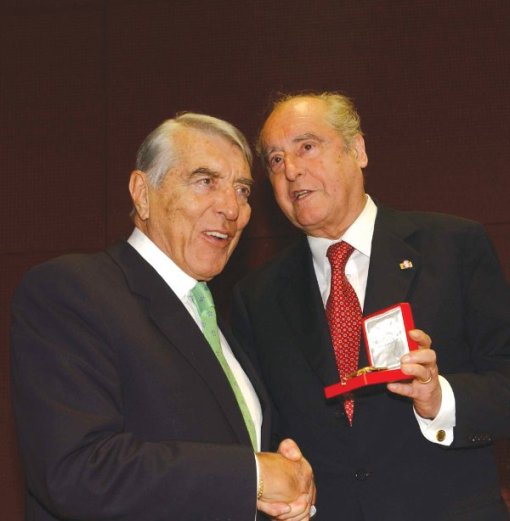“Absolutely absurd,“ stated Josef Pröll, Austria’s Finance Minister of the conservative ÖVP on Apr. 15 when confronted with the controversial remark by 2008 Nobel Prize Laureate and Princeton University economics professor Paul Krugman with regards to the possibility of Austria’s bankruptcy.
Krugman’s provocative statement with regards to the impact of the financial crisis on Central and Eastern European countries (CEE) at the Foreign Press Club in New York on Apr. 13 sparked high-profile responses and anger in Austria.
When responding to the question of high exposure of Eastern European debt by Austrian banks, and whether that might lead the country into bankruptcy, Krugman responded directly.
“Now it’s a tiny one, it’s Iceland, but that just shows that it can happen, even to advanced countries. Ireland looks pretty bad because of large financial exposure. And Austria would probably be my third candidate in those leads.”
And the New York Times columnist delights himself in his blog two days later of having created a stir by just stating the obvious.
Evidently, Krugman’s comment has revived a debate of the past month when media reports, such as by the Austrian daily Die Presse (‘When, exactly, will Austria go into bankruptcy?’), circulated, sparked by concerns of high account deficits in the CEE countries.
Austria’s banks (not including Bank Austria and Hypo Alpe Adria as foreign-owned), Pröll clarified, have lending exposures in the CEE area of about EUR 200bn – approx. 70% of Austria’s GDP – but they are apposed to savings deposited of 85% of that amount.
The Finance Minister also dismissed the scenario of a complete deficiency of lending, but rather estimates that 10% might have to be bailed-out. The latter seems inevitable, as the European Bank for Reconstruction and Development (EBRD) estimated already in February 2009, that bad debts are likely to exceed 10% of lending in the CEE countries.
Indeed, the severe financial troubles of Austria’s neighbours highlights the huge investment Austria’s banks did since the 1990s in the CEE countries. They are the exposed of all financial institutions invested in the area, led by Raiffeisen with 54% of its risk-weighted assets, and Erste Bank Group (38%).
Evidently Josef Pröll set off for a ‘face-list’ trip to Bulgaria, Romania, Croatia and the Ukraine in mid-February promoting the Austrian government’s proposal for a financial stability pact for the CEE countries.
However, Pröll’s good-will tour sparked fresh concerns for the Austrian financial sector. The Romanian online business magazine Wall-Street consequently titled on Feb. 17 ‘Romania can drive Austria to meltdown.‘ At the same time, Austria’s daily Der Standard estimated that 10% failure of CEE lending would lead to crash of the Austrian financial sector.
Not surprisingly, the rescue plan failed to convince the other EU members, as it seemed motivated by Austria’s self-interest only.
Krugman’s pointed comment therefore, might be exaggerated as Austria’s bankruptcy seems unlikely at this stage, but has a valuable point: The European governments should not dismiss nor underestimate the effect a widespread financial collapse of financial institutions inevitably has when the CEE countries are not stabilized.
If this part of the financial crisis is mishandled, Daily Telegraph columnist Ambrose Evans-Pritchard predicts a “debacle (that) is big enough to shatter the fragile banking systems of Western Europe and set off round two of our financial Götterdämmerung.”
Austria would then certainly play the leading role.
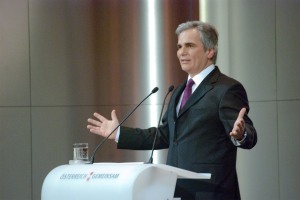 Chancellor Werner Faymann felt the need to celebrate on Dec 2, 2009 at the imperial Hofburg. Österreich.Gemeinsam (Austria Together) was the title of Faymann’s speech, the occasion was the first anniversary of the current Austrian government, led by Faymann since December 2008 at the time of economic crisis. The message was simple: all is well at home. Faymann’s skill as public speaker was impressive, evidently inspired by U.S. President Barack Obama in its delivery. But Faymann’s speech – unlike those of the current U.S. President – had only one fault: Staging a political show that demonstrates the art of talking a lot but saying very little.
Chancellor Werner Faymann felt the need to celebrate on Dec 2, 2009 at the imperial Hofburg. Österreich.Gemeinsam (Austria Together) was the title of Faymann’s speech, the occasion was the first anniversary of the current Austrian government, led by Faymann since December 2008 at the time of economic crisis. The message was simple: all is well at home. Faymann’s skill as public speaker was impressive, evidently inspired by U.S. President Barack Obama in its delivery. But Faymann’s speech – unlike those of the current U.S. President – had only one fault: Staging a political show that demonstrates the art of talking a lot but saying very little.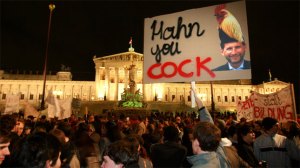 Photo: Students protesting in the streets of Vienna, Oct. 29. Photo Credit: Cremer / Der Standard.
Photo: Students protesting in the streets of Vienna, Oct. 29. Photo Credit: Cremer / Der Standard.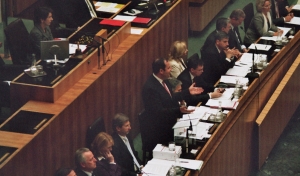 Photos: Finance Minister Josef Pröll (standing) delivering the budgetary speech, Apr. 21, 2009. Photo Credit: Matthias Wurz
Photos: Finance Minister Josef Pröll (standing) delivering the budgetary speech, Apr. 21, 2009. Photo Credit: Matthias Wurz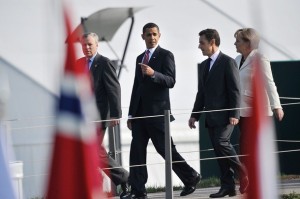 Photo: from left to right, (Former) NATO General Secretary Jaap de Hoop Scheffer, U.S. President Barack Obama, French President Nicholas Sarkozy and Germany’s Chancellor Angela Merkel at the NATO Summit 2009. Photo Credit: Getty Images
Photo: from left to right, (Former) NATO General Secretary Jaap de Hoop Scheffer, U.S. President Barack Obama, French President Nicholas Sarkozy and Germany’s Chancellor Angela Merkel at the NATO Summit 2009. Photo Credit: Getty Images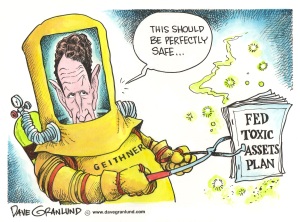
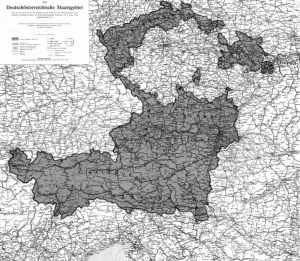 Photo: Historical Map of the Deutsch-Österreich territory of 1918. Photo Credit: Collection of Peter Wassertheurer
Photo: Historical Map of the Deutsch-Österreich territory of 1918. Photo Credit: Collection of Peter Wassertheurer